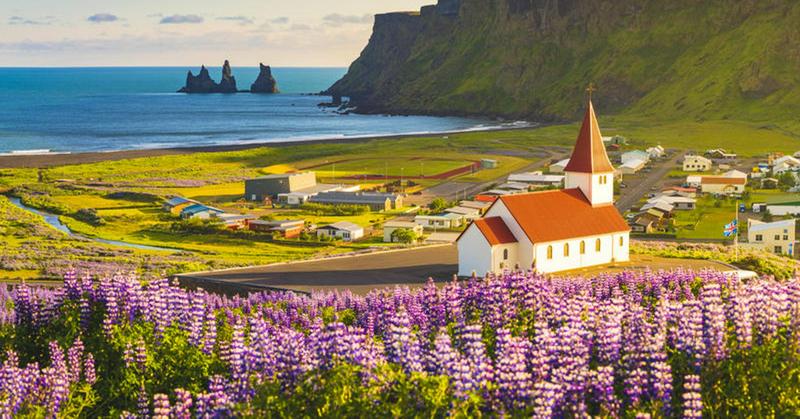Interesting Facts About Iceland
By | July 18, 2022

It Was Uninhabited For A Long Time
It may be impossible to know when Iceland was first discovered, as it has no indigenous population, but the oldest recorded discovery was by a Viking named Naddod in 861 C.E. Naddod was sailing from Norway to the nearby Faroe Islands but got lost and wound up on the shores of Iceland instead. It didn't receive its name until years later, and settlements began popping up in 874 C.E. This makes Iceland the second-to-last place on earth to be inhabited by humans, New Zealand being the very last.
Its Name Is A Little Confusing
Many note the oddity of Iceland's name, given its lush landscape, when compared to neighboring Greenland, which is in fact very icy. Some claim this was a gimmick to either get more people to move to Greenland or stay away from their settlements in Iceland, depending on the tale. However, in reality, Greenland's actual name was Kalaallit Nunaat, meaning "the land of the people." The Vikings simply called it Greenland because, at the time of their first contact in the 980s, it was indeed green. It wasn't until the 14th century that the Little Ice Age hit Europe, dropping temperatures and forcing the Vikings out of their increasingly icy villages on the land. As for Iceland, a Viking by the name of Hrafna-Flóki simply saw a bunch of icebergs while climbing a mountain and thought the name was good enough.

Icelanders Don't Have Family Names
Foreigners may be surprised to find entire families in Iceland who may very well all have different last names. That's because, instead of taking a family name, Icelanders' last names are a combination of their father's first names and the Icelandic word for either "son" or "daughter." For example, the child of a man named Jon would be given the last name "Jonsson" or "Jonsdottir." Of course, with a population of only 366,000 and naming customs that make it easy, losing track of who's related can have dire consequences, which is why apps have been developed specifically to help Icelanders avoid accidentally dating their cousins.

Most Icelanders Live In One City
Iceland is known for its natural beauty, but the vast majority of the population favors the city life. An estimated 66% of Icelanders live in the capital city of Reykjavik, which was settled back in the 870s but wasn't officially founded until 1786. It has a rich literary heritage (in fact, the whole country is well read, with one in 10 Icelanders even becoming authors!) and was home to Halldór Laxness, who won the Nobel Prize for Literature in 1955.
It's A Safe Haven For Political Exiles
Iceland may have extradition treaties with many countries, but that doesn't always mean they follow through. For instance, chess grandmaster Bobby Fischer became an American icon after beating Boris Spaskyy at the 1972 World Championship in Reykjavik, as Spaskyy was from the U.S.S.R. and Cold War tensions were high, but his attendance of a rematch with Spaskyy in Yugoslavia violated the United Nations embargo that was in place at the time, so the United States issued a warrant for his arrest. Fischer found sanctuary in Hungary and then the Philippines before his arrest in Japan, but he was allowed to make his way to Iceland, who hosted him for the rest of his life. Many in Iceland have also expressed sympathies for N.S.A. whistleblower Edward Snowden, though his citizenship application was officially denied in 2013.

